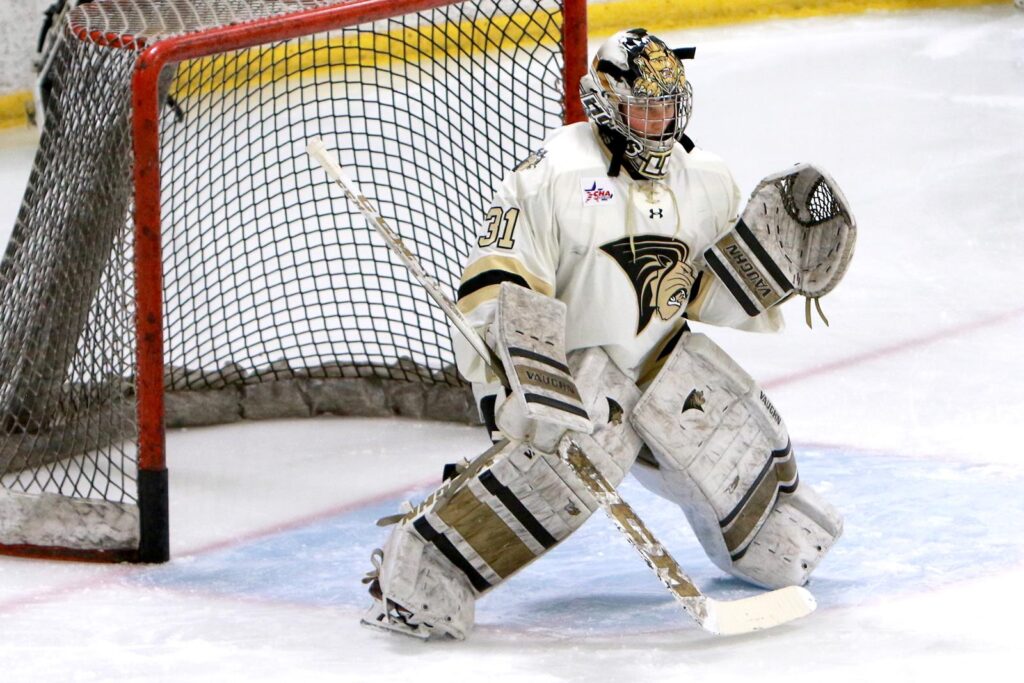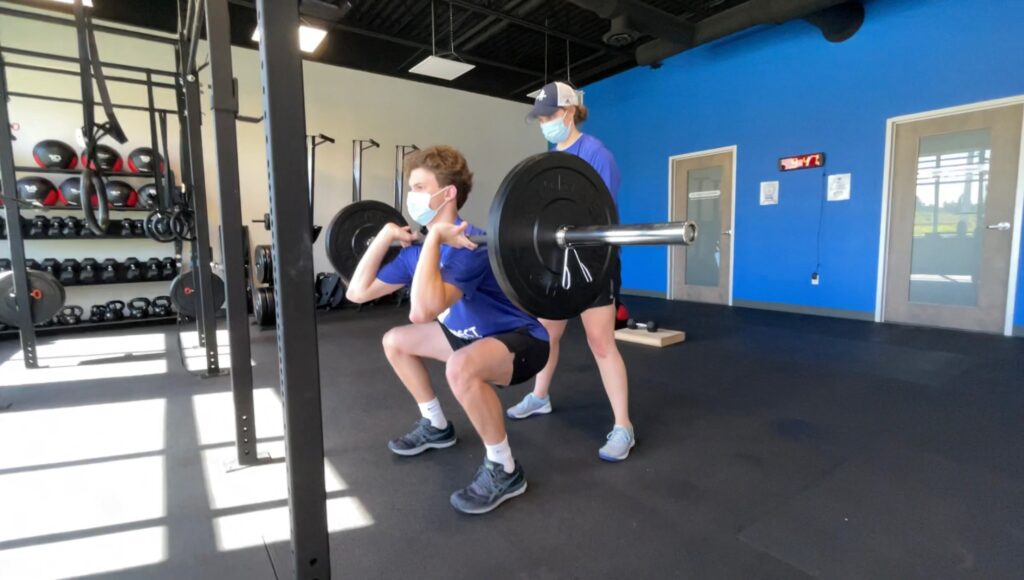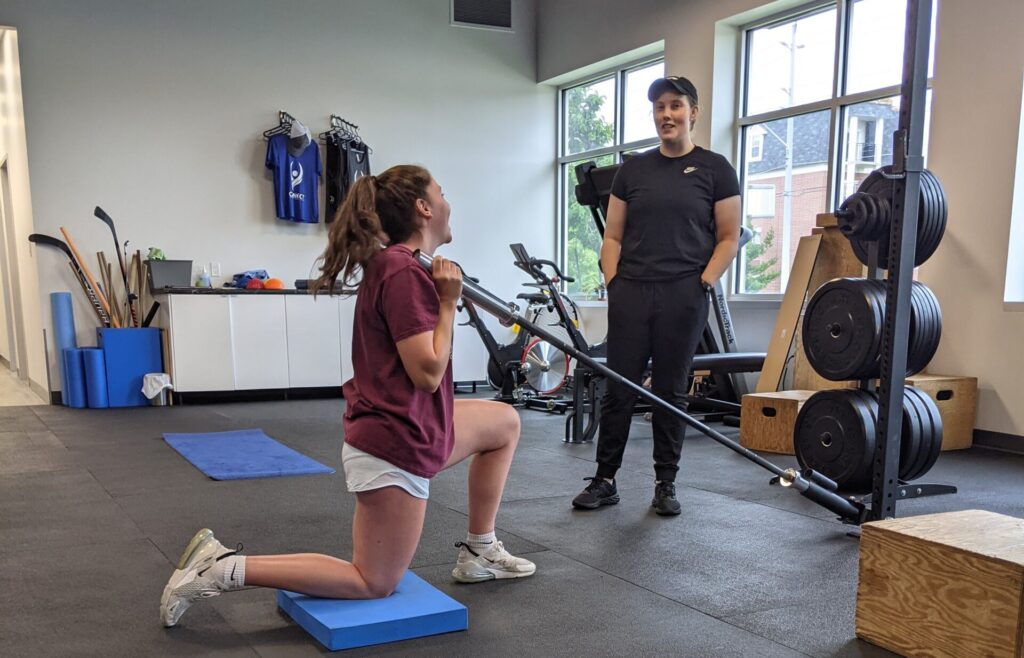Once upon a time I was an NCAA Division I athlete. I was a goalie for Lindenwood University Women’s Hockey, and it’s something I always have, and always will be proud of. The thing is, if you check my stats you’ll find out that I’m no Carey Price, but it’s not always about winning, and it’s not always about getting to the next level. Being an athlete is hard work: you put your body physically, mentally, and emotionally through a grind every single day, on and off the ice (or pitch, or court, or wherever you find your challenge).
If I didn’t go through that grind, I never would have had the opportunity to become a physiotherapist. If I didn’t battle through years of extra practices, early morning dryland and endless weekend travel, I wouldn’t have had the grit to push through the academics it took to land in this career. And if I hadn’t ever been injured, I would never have the perspectives I share with my patients today.
I like to believe that I think with two minds now: the mind of an athlete, and the mind of a physiotherapist.
It’s the lessons I learned through my years in sports that help shape the way I work with patients that are going through the same grind I went through. That’s the thing with the grind: the goal might look a little different for everyone, but it doesn’t change the level of work you put into it. Whether it’s reaching the next level in your sport, bouncing back from a major (or minor) injury, taking the next step in your journey to health, or achievements outside of physical health, the grind is an experience we all share.
It’s been about six years since I played high level hockey, but I still carry with me the mindset that got me through my grind. Today, I’d like to share with you some of the lessons that I’ve learned.
The Rehab Process Is Anything But Linear
As a teenager going through the college recruiting process, it quickly became ingrained that you always had to have a good face on, no matter how you felt. College recruiters are always watching out for chronically injured athletes, known in the sports world as “band-aids.”
By no fault of my own, I was labeled as one of those “band-aids”, and after sustaining my second concussion within the four month span that was my season, my phone suddenly went silent and the college offers were quietly pulled off the table. So when, through persistence and a little bit of luck, I landed at a Division I school, I was adamant that I was going to pull off the “band-aid” label and have a successful, injury-free, college career.
But life had other plans for me.
The day after I saw my first action in a college game, a knee injury left me sidelined and resulted in a season-ending surgery. What came next was a long, rough road of pain, sweat, tears, and stress. There were good days, like the first day I bent my knee past ninety degrees, the day I got to put down the crutches, or the first time I got to touch the ice and hear the stick taps and cheers from my teammates, but those good days were few and far between. There were days where I couldn’t sleep no matter how many painkillers I was prescribed. Days where my knee was the size of a football and, regardless of how bad I wanted it to, it wouldn’t move an inch. The hardest days for me, and I think most injured athletes will agree, was every day I spent in the stands, watching my team play, practice, and move on without me.
At the end of the day, all I could do was learn to put one foot in front of the other and press on. You will win some, and you will inevitably lose some, but the only way out is through. When things don’t go your way, you can either dust yourself off and keep going, or you can stop, but only one of those choices gets you where you want to go. My injuries gave me a lot of perspective not only on the ups and downs of rehab, but on the length of time. It’s never as fast as you want it to be, and it’s certainly not overnight. There were many days where I wondered to myself if I was actually getting anywhere, but then there’s the days with the victories, big or small, that make the struggle all worth it. So hold on, the best is yet to come.
It’s OK To Take A Break
When you’ve gone so hard for so long, either you choose to take a break, or your body will make the choice for you.
No. Days. Off. It’s a mentality that gets ingrained in high level athletes from a young age. In the NCAA there is actually a rule that athletes MUST have one day off each week. Towards the end of my career, I finally started figuring out that it was OK to take that day off. It was ultimately better to work smarter, not always harder.
Now, as a physiotherapist, I have a pretty good idea when someone is exhausted, be it from sports or just life I try to make a point of reminding people that planned days off actually help the cause more than hurt it. More is not always better, better is better. Better training, better planning, better rest. For athletes and individuals that have had pedal to the metal stamped into their brains, this can be a hard pill to swallow, trust me, I’m still learning this one, but it’s a valuable lesson when it’s put into practice. When you’ve gone so hard for so long, either you choose to take a break, or your body will make the choice for you.
Sometimes rest, or a day off, might not mean doing nothing, it might just mean doing something different, which brings me to my next point:
Stay Curious, Ask Questions And Be Open-Minded To Change
Anyone who has ever taught me anything can tell you that I ask a lot of questions, and I mean A LOT of questions, it’s how I learn and understand things. As an athlete, I spent long hours studying my game film, talking strategy with my goalie coach, and, of course, asking questions. As a new grad physiotherapist, I hope that I can stay as curious as I am now until the day that I see my last patient.
I want my patients to feel like they can ask questions and pick my brain because it forces me to think critically about every single case, which helps me be a better physiotherapist and a better advocate for the people that I’m lucky enough to work with. Questions help my athletes understand exactly what’s going on with them which, from my own experience, is incredibly helpful when you’re wading through a medical system that isn’t designed with your understanding in mind.
Staying curious also entails actively listening on both ends of the conversation. For clients, this occasionally involves hearing things that we may initially resist, such as being open to new ideas, willing to try novel approaches, and ready to adapt or scale our expectations of ourselves. There will be days when our abilities fall short of our expectations, and that’s perfectly okay. For me, staying curious has meant starting to do more yoga to deal with long standing hip problems, even though it’s out of my comfort zone of strength training and conditioning. Being open-minded to change has meant altering my training schedule to focus on better rest, which will ultimately allow me to train better, longer. These slow changes in my mindset have made me a better recovering retired athlete, and they’re making me a better physiotherapist.
My advice to all athletes, at any point in their careers, is to give yourself a break, take a breath, reflect, have fun, and don’t take yourself too seriously.
Today, I’m six years removed from the limelight of high level athletics, and it’s fair to say that I miss it, a lot. While my inner athlete that used to burn so brightly under the lights of competition is now more of a candle than a bonfire, it’s a flame and a mindset that I’ll never lose. My advice to all athletes, at any point in their careers, is to give yourself a break, take a breath, reflect, have fun, and don’t take yourself too seriously. Believe it or not, there is a life outside of sport, I was forced to find it when I was injured, and I’ve been privileged enough to find it again, only better, now that I’ve left competition. I’m lucky enough to see athletes from all sides now, and for me there is nothing better than watching one go from a season-ending injury to rejoining their team for the first time. Sports, and life, can be a grind, but something good will always come out of that grind, sometimes you just have to look at it a little differently.
To view the original article on CONNECT Rehab, click here
To learn more about Sarah, you can visit her Instagram here



